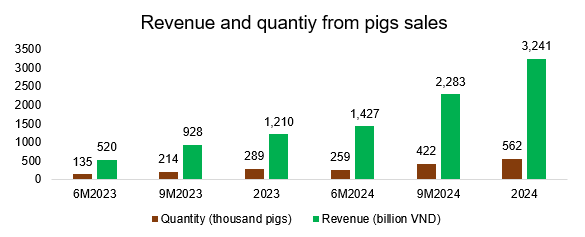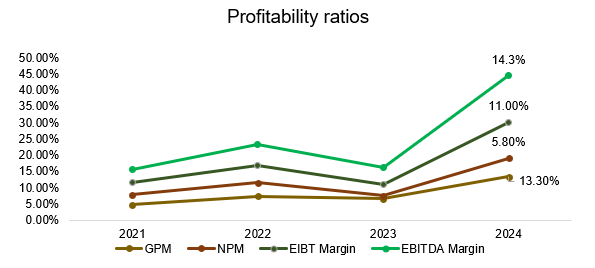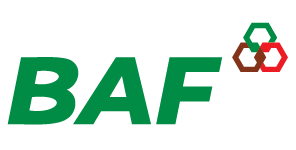The sharp increase in total herd size, reaching nearly 800,000 pigs, has driven a significant rise in both quantity and revenue, more than doubling in 2024. Specifically, BAF’s pig sales revenue reached VND 3,241 billion, 2.6 times higher than the same period last year, generating a pre-tax profit of VND 393 billion-the highest since its listed and exceeding the annual target.

BAF Vietnam Agriculture Joint Stock Company (BAF, the Company) has just announced its Q4 2024 consolidated financial report, showing remarkable growth in livestock operations. This result reflects the Company’s consistent expansion of herd size under the 3F model (FEED-FARM-FOOD) over recent years. As of now, BAF’s total herd has reached nearly 800,000 pigs, doubling compared to 2023.
In Q4/2024, pig sales quantity exceeded 140,000 pigs, with commercial pigs making up the majority, reflecting a 185% increase. Pig sales revenue nearly tripled to VND 958 billion. For the full year 2024, BAF sold 570,000 pigs-double the previous year-driving livestock revenue to VND 3,241 billion, 2.6 times higher than in 2023.
Net revenue for Q4/2024 was recorded at VND 1,626 billion, with livestock sales contributing nearly VND 958 billion, accounting for 60% of total revenue. The Company’s proactive feed production, sourced from two “vegetarian” feed mills meeting GLOBAL GAP and FSSC 21000 standards, along with a 10-20% decrease in raw material costs, helped reduce cost of goods sold (COGS). As a result, COGS decreased by 12% YoY. Gross profit (GP) reached nearly VND 230 billion, a 457% increase YoY, with a Gross profit margin (GPM) of 14%, while the livestock segment achieved a 22% GPM. Pre-tax profit exceeded VND 118 billion, marking a significant increase from the previous year.

For the full year 2024, consolidated net revenue reached VND 5,554 billion, a 7% increase YoY. Revenue composition showed a structural shift, with livestock sales now accounting for 58% of total revenue, up from 23% in the previous year. COGS was recorded at VND 4,815 billion, a slight decrease of 1%.
Gross profit exceeded VND 738 billion, doubling YoY, with a gross margin of 13%, up from 6.6% in the previous year. The livestock segment’s gross margin was 21%. Selling and administrative expenses increased by 30% as BAF brought six new farms into operation. Pre-tax profit (PAT) reached nearly VND 393 billion, the highest since listing, surpassing the annual target.

As of the end of June 2024, the Company’s total assets reached nearly VND 7,466 billion, a 7% increase from the beginning of the period. Inventory stood at VND 2,151 billion, a 35% increase, including pigs scheduled for market release before and after the Lunar New Year.
Short-term receivables decreased by 78% YoY to VND 194 billion as part of the Company’s strategy to scale down agricultural trading activities. Construction in progress reached VND 931 billion, a 21% increase, including farms scheduled to commence operations in early 2025.
BAF’s financial indicators reflect a stable financial position, with current and quick ratios at 1.3x and 0.4x, respectively.
Continuous Expansion of Livestock Operations
Over the past year, Muyuan Foods signed a strategic partnership with BAF to transfer smart farming technology and AI-integrated operational systems, ensuring biosecurity and environmental sustainability. This marks Muyuan’s first strategic partnership outside China.
This collaboration allows BAF to optimize costs, enhance productivity, and maintain high biosecurity standards. BAF is confident in reaching a pig sales volume of over 1 million in 2025 and aiming for 10 million by 2030.
Following the partnership with Muyuan, BAF has conducted M&A transactions involving 13 companies in the past two months. These companies own land and pig farms, with legal procedures being finalized before construction begins. The farms are expected to be operational between 2025-2026, with an estimated capacity of nearly 63,000 sows and 500,000 commercial pigs. The recent M&A activities align with BAF’s strategy to become a leading livestock company, positioning itself advantageously amid limited pork supply due to disease outbreaks and the enforcement of the Livestock Law from January 1, 2025.


